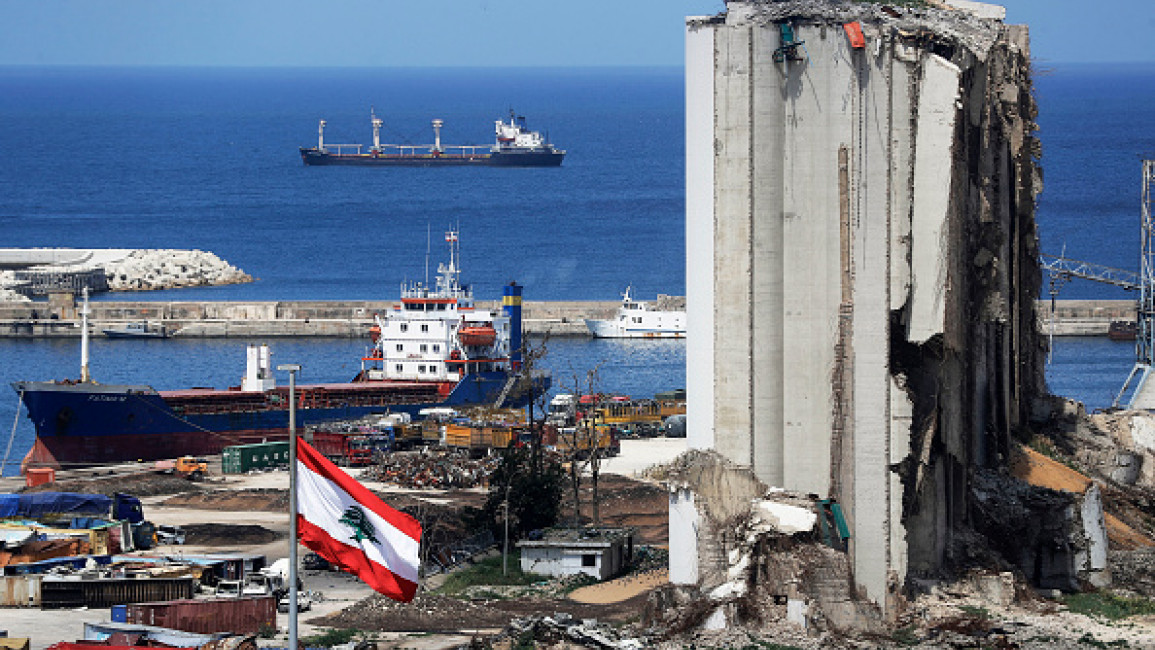Russian delegation arrives in Lebanon on mission to secure Port of Beirut reconstruction contract
A delegation of Russian officials and business people arrived in Lebanon on Monday to complete the technical diagnostic phase of their plan to reconstruct Beirut port - destroyed in a 2020 blast - as well as other infrastructural projects in Lebanon.
The delegation includes the Russian infrastructural company Hydro Engineering and Construction, which is leading the tentative project to repair the port. The delegation will also study the feasibility of repairing two oil refineries and two power plants in other parts of Lebanon.
The company is currently considering three different approaches for the repairs. After collecting more technical details this week, the company is set to prepare its technical report on Saturday,
Hasan Moukalled, a Lebanese economist and the coordinator of the delegation’s visit, told The New Arab that once the report is finished, it will be discussed within the Russian company to finalise the reconstruction plan.
"They will draw the Beirut port and do a complete modeling of it, and in Tripoli they are studying its refurbishment, as well as investing in the free zone," Moukalled said.
The Port of Beirut was heavily damaged after an explosion in August 2020 which killed around 200 and injured 6,000. Since then, a number of companies and countries have put forth tentative offers to rebuild it.
In April, representatives of several German companies outlined a multi-billion-dollar plan to rebuild the port of Beirut and surrounding neighborhoods. Germany’s consortium, led by Hamburg Port Consulting and Colliers, was the first to visit Lebanon with a plan in hand that they presented to Lebanese officials. Soon after, French shipping conglomerate, CMA-CGM, outlined its own plan to rebuild the damaged port.
As of yet, however, no plans have proceeded past the proposal stage.
The Russian delegation will spend three days at the Port of Beirut and another three in the Port of Tripoli to study the feasibility of repairing wheat silos there, Lebanon Transport Minister Michel Najjar told local media after a meeting with the Russian delegation Monday morning.
A government-commissioned study in the wake of the explosion said the 50-year-old silos could collapse at any moment and should be demolished.
The delegation will also collect technical details for its project in Tripoli. In 2019, Lebanon signed a deal with Russia’s largest oil company, Rosneft, to upgrade and operate storage installations in Tripoli, which let the Russian company manage storage operations for Lebanon's northern port city.
The Russian delegation is also planning on refurbishing two oil refineries in Lebanon: one in Tripoli and one in the Zahrani refinery in southern Lebanon.
Further, the group is in the early stages of evaluating proposals to invest in two power plants through a Build-Operate-Transfer (BoT) scheme, where a Russian company will refurbish and operat the power plants for a number of years before returning them to the Lebanese state.
"They are studying the electrical stations on paper for now and are looking at the technical requirements that the ministry requested, but they still need a lot of data before they conduct a site visit," Moukalled said.
He added that they still are still choosing between three power plants: Zahrani in the south, Deir Ammar in Tripoli, and Selaata on Lebanon's northern coast.
Lebanon is currently experiencing rolling blackouts, with government-supplied electricity only available for two to five hours a day in some parts of the country. The networks of generators which supply Lebanese homes with electricity during government outages have also started rationing supplies due to limited fuel supplies.
The Russian delegation also has political implications for Lebanon, and for Russia's place in the region.
The honorary consul to Russia in Tripoli, Jacques Sarraf, pointed out that the delegation traveled on the first Aeroflot flight to Lebanon since the airliner canceled trips to the country due to the Covid-19 pandemic.
"They are sending a message: Russia is back and we want to rebuild Lebanon in its most important sector," Sarraf told The New Arab.
(Additional reporting from AFP).



